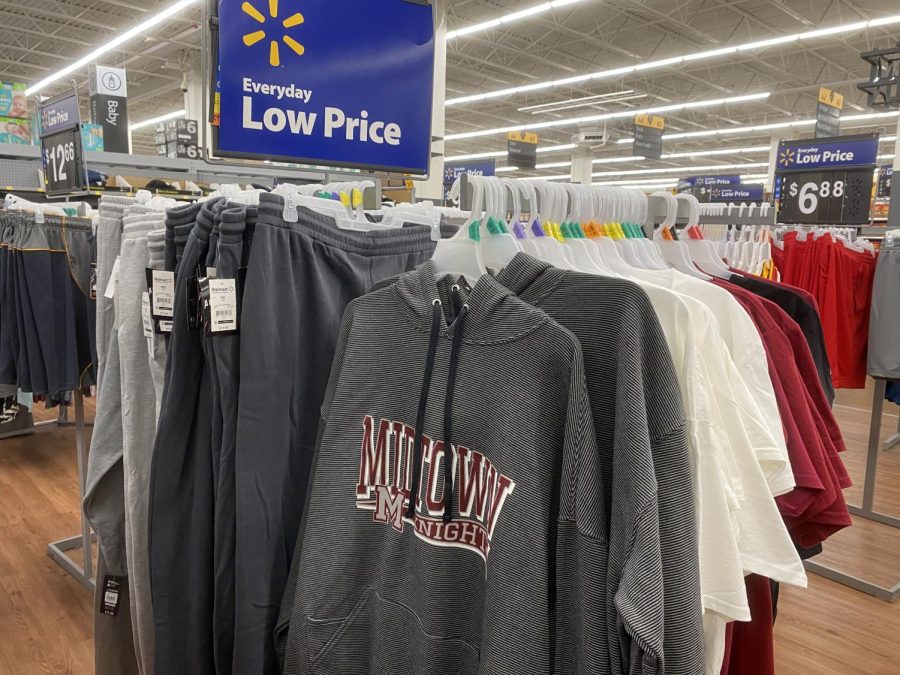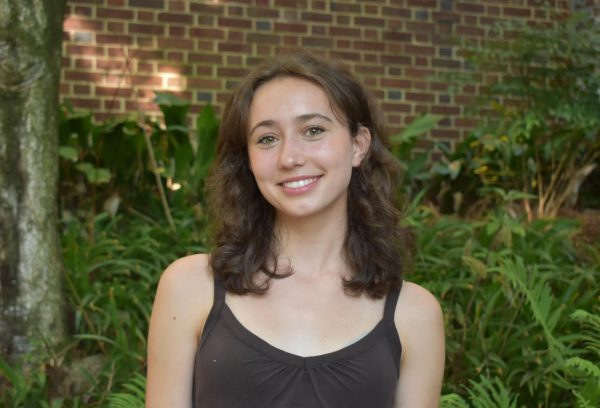Retail licensing royalties bring less than $1,600 to school over 14 years
GHSA displays Midtown apparel at Walmart on 17th Street.
April 14, 2023
Midtown apparel like socks, sweatshirts and hats can be found in local stores such as Publix and Walmart. A large sign over the merchandise in Publix, reads, “A portion of the proceeds is donated to your local school.”
Currently, Midtown has licensing agreements with two organizations: Georgia High School Association (GHSA) and private licensing company OhioPyle81, which allows these organizations to provide merchandise at retail locations. However, Midtown has only received $1,600 in licensing royalties over the past 14 years.
“Midtown (Grady) received seven checks in the last 12 years, with payments ranging from the lowest $2.82 in 2018 to the highest $69.54 in 2022,” GHSA Business Manager Robin Bullington said.
In comparison, Midtown High School Athletic Booster Club merchandise sales have turned a profit of nearly $5,000 from just the 2021-2022 school year, with a total revenue of $13,191.35 in 2022.
GHSA has a policy where schools will receive 60% of the royalty based on a standard 10% licensing fee on the wholesale price of the goods, or 6% of the total sale revenue. Midtown (Grady) has check receipts with GHSA dating back to 2011 and received a check for the first time in two years of $69.54 in 2022.
“Based on these check amounts, I am assuming that the majority of [Midtown’s] apparel with the logo is not coming through the GHSA licensing program but rather from some of the smaller businesses,” Bullington said.
In other words, according to Bullington, smaller businesses exist that are not contractually licensed to sell Midtown apparel, and thus, are not paying royalties back to the school.
“If you see merchandise being sold in stores with your school’s logo, if it does not have a ‘NFHS hang tag,’ then it is not part of the GHSA licensing program, and your school does not receive licensing royalties for that sale,” Bullington said. “This would include any type of small store or vendor local to your school that may produce fan-type apparel for sale.”
OhioPyle81 and GHSA state on their websites, and in signed agreements, that a percentage of total net sales flows back to the high school the merchandise promotes, in accordance with standard licensing practice.
“OhioPyle81 issues 7% of the total net bill invoiced to our retailers back to the school on a quarterly basis so long as an invoice is produced within said quarter,”its website says.
Midtown has received 11 quarterly checks from OhioPyle81 in the past 14 years, with the largest on Oct. 31, 2020 and the lowest on July 30, 2021. All checks have been processed by school secretary Pamela Matthews.
“They have been sending checks,” Matthews said. “These checks have been getting significantly smaller in recent years though.”
Tonya Humbert, OhioPyle81’s Licensing Coordinator, is aware of exterior activity occurring where licensing payout money is not flowing back to schools.
“When we started the program, we wanted to make sure we were giving something back to the school because our whole line is community-based,” Humbert said. “We knew at that time there were retailers out there carrying high school apparel without giving anything back to the schools, taking advantage of the fact that most high schools don’t have licenses by making it not trademark-registered.”
During the transition of the school name change from Grady High School to Midtown High School in 2021 when there were no official logos created, merchandise was sold with unofficial, more standard marks. This caused confusion among some teachers and staff like U.S.History and current events teacher James Sullivan.
“A couple of years ago, [art teacher] John Brandhorst and parents and students from the community saw this merchandise that was at Publix that said all proceeds go to Midtown High School,” Sullivan said. “We were like, “We’ve never heard of anything like this. What’s going on?’ It caused lots of confusion because it seemed to have a different logo.”
Sullivan used his background as an intellectual property lawyer to help look into the issue.
“In large sports organizations, there are squadrons of lawyers who are on the lookout for [trademark infringement] all over the place, but that’s not what happens at the high school level,” Sullivan said. “I don’t think there’s really people policing that, and I think that maybe that’s why this slipped through the cracks; they’re not many hands that it goes through in that situation. But we should ensure that with all deals struck we are on the same page.”







